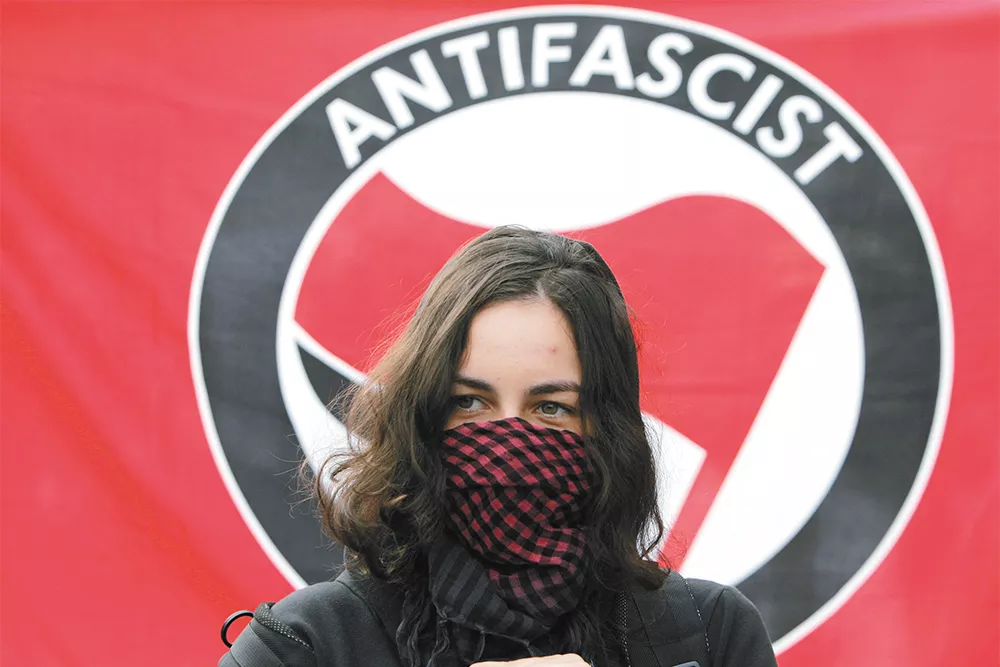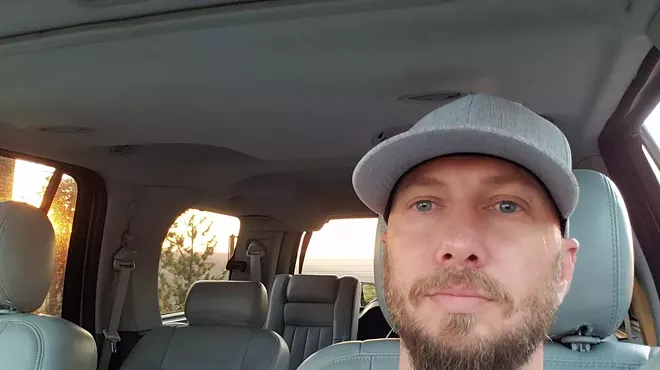
Antifa was planning to riot in Spokane and North Idaho.
That, at least, was the claim put forth in the widely shared images that set local right-wing circles in a tizzy in November of 2017. Antifa never showed. The same claim was shared in November of 2018. Antifa didn't show.
But this year, there actually were riots, including in Spokane.
While Spokane's protest on May 31 was largely peaceful, there were exceptions. Windows at downtown businesses like Nike were shattered and merchandise was stolen by looters. Protesters threw water bottles and other objects at police officers. A man threw a crude attempt at a Molotov cocktail. And that night, Spokane Sheriff Ozzie Knezovich blamed "a group of antifa socialists" for the destruction.
He doubled down in a press conference the next morning.
"There's a lot of reporters that have contacted me this morning: 'Are you sure it was antifa?'" Knezovich said. "I'm going to give you one definitive answer. And the answer is yes."
He says he had information from confidential informants. He says that officers had seen antifa T-shirts. He says that antifa came here in the three vehicles and were communicating with Motorola headsets.
"We had all the earmarks from the Portland area," Knezovich says. "Let's just stop the nonsense. Let's own what's happened here."
Today, more than a month has passed since the initial protests in Spokane.
No evidence has been released by law enforcement to support the notion that anybody connected to the antifa movement was directly responsible for any of the looting, destruction or violence at the May 31 rally in Spokane. Nearly all of the arrests that have been made have been locals, including several who already had a criminal background.
Antifa is a very loose assortment of secretive groups and anonymous individuals dedicated to aggressively — and occasionally violently — opposing white supremacists and other far-right groups. In the last few years, footage of squads of black-clad and masked antifa activists brawling with right-wing Proud Boys and Patriot Prayer hooligans in the streets of Portland repeatedly made national news.
But ever since the protests against racism and police brutality cropped up in May, antifa has taken on a new role in the public imagination: riot scapegoat. Antifa agitators have repeatedly been blamed for the fires, violence, vandalism and looting that have been perpetuated by a fraction of protesters. And local protest organizers like longtime left-wing activist Dustin Jolly worried that all the antifa blame could obscure their police reform message.
"You have a lot of scared people," Jolly says. "[A Black Lives Matters protest] isn't something to be scared of. This isn't antifa trying to come in and burn all your businesses down."
ANTIFA EVERYWHERE AND NOWHERE
The claim that antifa was to blame for the protest violence was a national phenomenon, put forward by figures like President Donald Trump and Attorney General William Barr.
On June 22, the Washington Post's Fact Checker column, in a "Four Pinocchio" fact-check, noted that there hadn't yet been a "single confirmed case in which someone who self-identifies as antifa led violent acts at any of the protests across the country."
While a self-proclaimed antifa supporter was subsequently arrested for trying to tear down the Andrew Jackson statue in Washington, D.C., Jessica Reaves, editorial director with the Anti-Defamation League's Center on Extremism, tells the Inlander that "we have not seen any evidence of substantial or organized, quote, 'antifa' presence at these rallies," she says.
In Spokane, however, Jolly confirmed he did see a few people at the week's first protests wearing gear with antifa logos — and not local activists he recognized. Kurtis Robinson, the president of the local NAACP, says that he referred concerns about potential antifa violence to the Police Department before the first protest.
And Knezovich, who accuses journalists locally and nationally of scrambling to try to shield antifa from responsibility, hasn't altered his original conclusions. He claims that agitators were accomplices to crimes by directing the young people who committed the violence and destruction using communication gear. So far, however, nobody arrested in Spokane has been tied to antifa.
"We're still putting cases together on some of those folks," Knezovich says. "I'm not gonna be able to give you a lot of information."
To bolster his claims of antifa violence, Knezovich connects Spokane Police Chief Craig Meidl into a conference call with the Inlander.
But Meidl doesn't go nearly as far with his claims. There was an incident, Meidl says, where a number of protesters surrounded a police car, including a woman with a megaphone who identified herself as antifa. However, in that incident, nobody was harmed and no property was damaged.
"We know there were people claiming to be antifa, and seemed to be trying to rally and stir things up," Meidl says. But at this point, he says, he hasn't been able to say they were specifically involved in any damage.
"We've never come out and said it was 'this group' or 'that group,'" Meidl says. "Unless we were able to physically make that arrest, it was challenging to identify people involved."
Even then, it's not like antifa activists generally carry membership cards in their wallets.
Reaves says the days of being able to identify antifa activists or anarchists by their black clothing, helmets, or masks are over — they've been widely adopted by protesters of all stripes. And with the spread of coronavirus, masks are often a sign of following the law, not breaking it.
Spokane Street Aid founder Rebecca Daignault-Walker passes out fliers to protesters that tell people to mask up for multiple reasons: "Not only are masks and goggles vital for slowing the spread of COVID-19, but they're also good for helping to remain anonymous while protesting."
To Knezovich and Meidl, carrying gas masks, wearing body armor, and lugging around jugs of tear-gas neutralizing milk is evidence protesters are ready to riot. But some protesters say it's more about being prepared for violence from the police.
"Police have shown they are not afraid to fire on peaceful protesters," Daignault-Walker says.
WHAT DOES ANTIFA MEAN TO YOU?
Even for those who proclaim their allegiance to antifa's principles, the meaning is amorphous.
To Knezovich, antifa is a leaderless terrorist group, the latest incarnation of anarchists "dedicated to the overthrow of the capitalist system of America."
"Antifa is a domestic terrorist threat," Knezovich told an Idaho GOP group this March during one of his signature "Threats We Face" presentations. "There's no ifs ands or buts about it."
The radical who was killed last year while trying to bomb the ICE detention center in Tacoma with a propane tank claimed in a manifesto to be antifa.
But to others, "antifa" is more of a philosophy or a tactic than an organization. Anyone opposed to neo-Nazis and white supremacists is antifa, a definition so broad as to include Martin Luther King Jr., Indiana Jones and Knezovich himself.
"Everyone at a Black Lives Matter protest is antifa because they're all there to protect black people from fascism," says Jeremy Logan, vice-chair of the Spokane's Democratic Socialists of America.
Still, the Inlander reached out to the established antifa groups in the region and asked for comment.
A message sent to the Emerald City Antifa Facebook page resulted in a response that the Inlander's questions sounded like they came from "either a grifter or a fed" and that we should accept "the copious amounts of evidence and reports showing that cops are lying sacks of shit."
"What do you want, a schedule of where all the antifas were and what we were all doing instead of plotting made-up shit in Spokane?" the Emerald City Antifa wrote.
("You're expecting these groups to say, 'Yeah, we are involved in starting riots?'" Knezovich scoffs.)
A voicemail message left with the website associated with Portland's Rose City Antifa resulted in a phone call a week later from an antifa activist who uses the pseudonym "Morgan." Citing the risk of right-wing backlash or law enforcement repression, her group is strictly anonymous, making it difficult to verify any of their claims.
Still, when asked if Rose City Antifa sent anyone to the protests in the Inland Northwest, Morgan laughs.
"No," she says. "We respect the autonomy of organizers and activists in Spokane and Northern Idaho to determine how they want to respond to things."
But Jolly and other progressive activists the Inlander spoke with weren't aware of any local antifa groups.
Morgan says there had been a group with a similar philosophy to antifa — Spokane Anti-Racist Action — but wasn't aware if it was still active. Their last Facebook post was nearly a year ago.
Morgan suggests Rose City Antifa has been involved in the protests in Portland, but stresses that they haven't led them or organized them. But she won't talk details. As a matter of principle, antifa won't reveal tactics, even to condemn them. They won't say who's a part of antifa and who's not.
Asked how I should know, then, if any action is associated with antifa, Morgan is blunt.
"You don't," Morgan says.
And yes, she knows that can be a problem.
"As long as we remain anonymous, which we will forever, people can choose to think whatever they would like about the group of mystery people," Morgan says. "It does open us up to a lot of unfounded conspiracy theories and attempts to make us out to be boogeymen."
Groups like antifa are used as an excuse, she adds, to "avoid addressing the actual concerns of black people and black organizers."
"People were saying 'antifa is everywhere,' but we're saying 'No, they're not.' They're not driving everywhere."
THE MASQUERADE
Anyone can wear the antifa mask. Even far-right trolls.
On May 31, @Antifa_US Twitter account announced that "tonight's the night, comrades" that they would attack residential areas and "take what's ours." It was a hoax perpetrated by Identity Evropa, a genuine white supremacist group.
Fake Twitter and Facebook accounts with names like "Beverly Hills Antifa" have abounded in the last three years, including in Spokane.
"What we are seeing is a fair amount of disinformation from right-wing extremists targeting antifa," says Reaves, with the ADL.
In early June, the rumor that antifa was traveling from town to town in vans or buses, starting riots, was pervasive in right-wing circles across Idaho, Washington and Montana. In Forks, Washington, locals cut down trees to prevent a multiracial Spokane family of campers from leaving, believing them to actually be a busload of antifa members.
On June 2, the Washington Fusion Center, a public safety intelligence hub for Washington state agencies, warned police chiefs and sheriffs to be wary about putting out information about antifa without verifying it, warning of an ongoing "disinformation campaign."
"Information like antifa was driving around in vans everywhere and coming to every little community," Washington State Patrol Lt. Curt Boyle, director of the Fusion Center, tells the Inlander. "People were saying 'antifa is everywhere,' but we're saying 'No, they're not.' They're not driving everywhere."
The incorrect info was so pervasive and coming from so many different directions, Boyle says, that they weren't able to determine whether it was intentional disinformation or simply mistakes that went viral.
To this day, Knezovich says, his department hasn't been able to "nail down" any of the three antifa vehicles he claimed had arrived in Spokane. While he says that vehicles with Seattle-based license places parked in "strategic locations" in Spokane during the third week's protest, there wasn't any violence during the third week protest.
But once currently confidential information comes to light, Knezovich is certain that he will be vindicated.
"Eventually, I hope we can release some of this," Knezovich says. "I want to have that conversation. It's time. I've never seen people work so hard to discredit anything." ♦




























